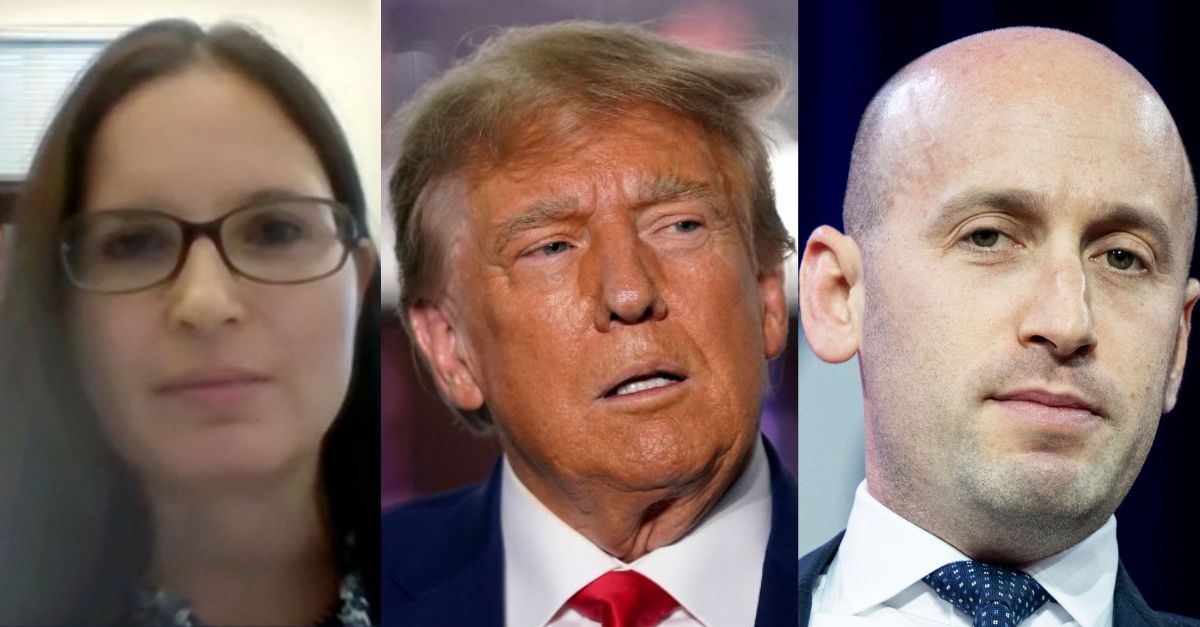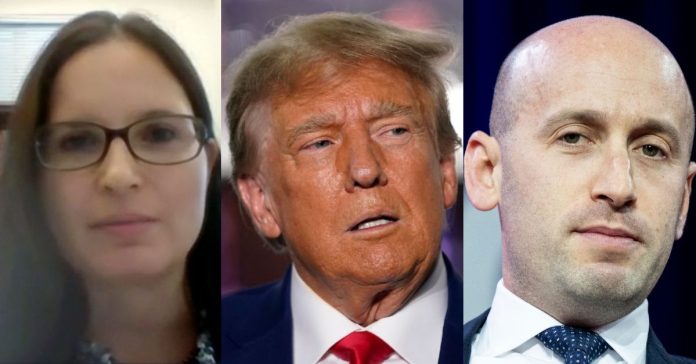
Left: Judge Aileen Cannon (U.S. Senate); center: Donald Trump (AP Photo/Andrew Harnik, File); right: Stephen Miller (Michael Brochstein/Sipa USA via AP Images).
The judge overseeing the Mar-a-Lago documents case against former President Donald Trump on Wednesday allowed two pro-Trump legal groups to file pretrial briefs as amici curiae, or friends of the court.
The terse, paperless order by U.S. District Judge Aileen Cannon grants leave to file to the America First Legal Foundation (AFL), headed by former Trump White House senior adviser Stephen Miller.
Also allowed to says its piece in the case is Citizens United, the group known for its successful evisceration of federal campaign finance law before the U.S. Supreme Court. Leading the second filing is former U.S. attorney general Edwin Meese, who served under Ronald Reagan.
“The Court has reviewed the motions and finds that the proposed amici bring to the Court’s attention relevant matter that may be of considerable help to the Court in resolving the cited pretrial motions,” Cannon wrote. “The amicus briefs are accepted for Court consideration.”
In other words, both filings now have some chance of influencing the legal arguments ultimately embraced by the judge.
The Meese-led filing was submitted on Tuesday.
In the combined motion, the ex-attorney general lists off his bona fides along with those of two different Citizens United groups, Boston University School of Law Professor Gary Lawson and Northwestern Pritzker School of Law Professor Steven Calabresi — who, notably, cofounding one of the three original chapters of the Federalist Society.
The Meese-Citizens United motion says their brief intends to focus on an issue previously raised by Trump in a Feb. 22 motion to dismiss — an Appointments Clause attack on the basic fact that special prosecutor Jack Smith is even working on the Mar-a-Lago case at all.
Trump, by way of his attorneys, has argued that Smith was unlawfully appointed special counsel because he was not approved by the U.S. Senate. Additionally, Trump claims the special counsel’s office is being unlawfully funded outside the typical congressional budgeting process in violation of the Appropriations Clause.
The budgetary issue, however, is not addressed in the second amicus briefing — which focuses entirely on the special counsel’s appointment.
“Smith does not have authority to prosecute this case,” the amici argue. “Those actions can be taken only by persons properly appointed as federal officers to properly created federal offices. But neither Smith nor the position of Special Counsel under which he purportedly acts meets those criteria. He wields tremendous power, answerable to no one. And that is a serious problem for the rule of law — whatever one may think of former President Donald Trump or the conduct Smith challenges in the underlying case.”
The brief goes on to argue that “Appointments Clause objections” are “structural” and “constitutional” issues of the highest caliber “that should be treated as a priority over standard defenses.”
In other words, the Meese-Citizens United amici are jockeying for first position — telling Cannon she should dedicate time and rule on this issue before any other pretrial motions in the long-delayed case.
“The legality of Jack Smith’s appointment is a potentially fatal flaw in this entire prosecution, and as such must be resolved before this case proceeds closer to trial,” the filing by lead counsel Edward H. Trent argues. “He wields extraordinary power, yet effectively answers to no one.”
As Law&Crime previously reported, Miller’s group filed their proposed amicus brief on March 1. The AFL claims it has “expertise” on both the Presidential Records Act (PRA) and the National Archives (NARA).
Citing its own “scholarship on” and investigations into the “weaponization” of NARA, the AFL’s motion claims to have “uncovered” proof NARA committed an “unlawful abuse of executive authority” by working with the Biden White House and the U.S. Department of Justice to engineer the Mar-a-Lago raid.
In their accompanying brief, the Miller-led amici argue Trump’s indictment should be thrown out because NARA’s criminal referral to the DOJ ran afoul of the Administrative Procedure Act.
Should Smith, or any of the defendants, decide to respond to the amicus briefs Cannon will potentially be consulting for guidance in the case, the deadline for those responses is March 15.
Matt Naham contributed to this report.
Have a tip we should know? [email protected]

